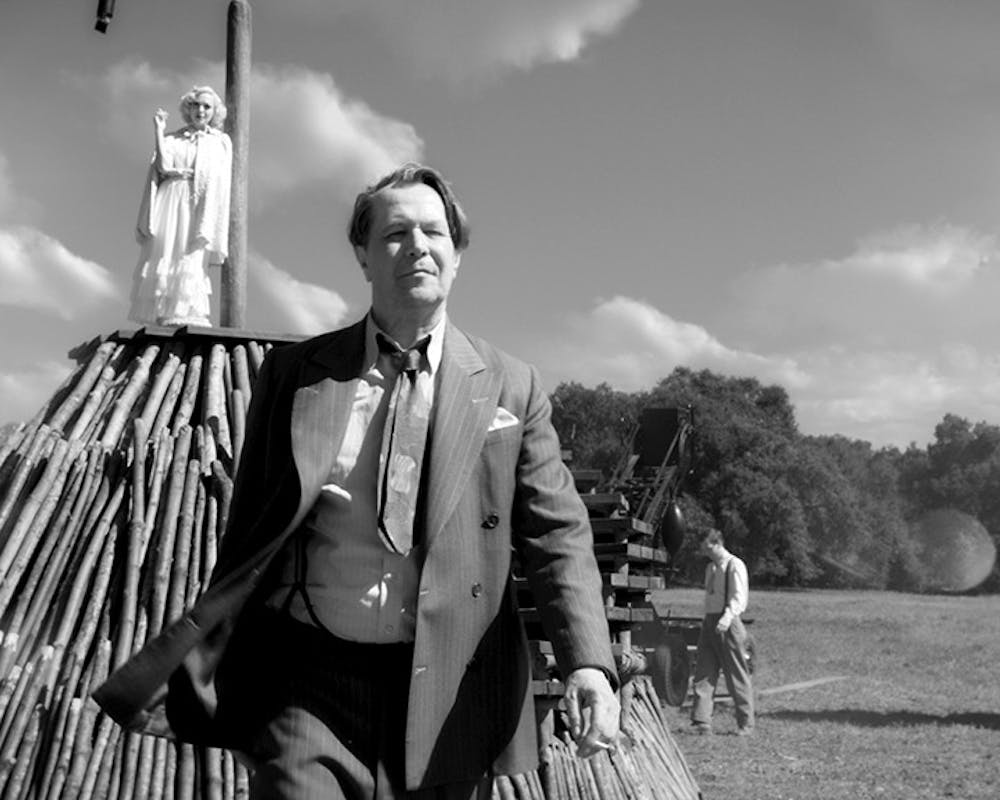Movie: "Mank"
Release Date: Nov. 13, 2020
Director: David Fincher
Runtime: 2 hours 11 minutes
Genre: Drama
Rating: A+
Taking place in 1930s Hollywood, David Fincher’s "Mank" follows the career of screenwriter Herman J. Mankiewicz and his relationship with Orson Welles while writing 1941’s "Citizen Kane." Mankiewicz’s presence in old Hollywood is that of a devil’s advocate; he’s invited to dinner parties with studio executives where he challenges various political figures and flirts with their female guests to deliver doses of reality to these larger-than-life figures.
Mankiewicz as a court jester feels parallel to Fincher’s career: Both hold deep disdain for the studio system and produce projects that are pessimistic visions of America.
Mankiewicz, played by Gary Oldman, is a perfect vehicle for this disdain. He spends most of his screentime making sly observations about the hypocrisy of the wealthy studio executives and how they take advantage of their employees.
“Being rich and powerful and making no excuses for it is only admirable in real life,” Mankiewicz says to a room of executives, criticizing them for selling morally upstanding characters to audiences despite their real-life wealthy greed.
An example of this hypocrisy is Louis B. Mayer, a studio head at MGM and the most common recipient of Mankiewicz’s criticisms. Mayer is shown asking his employees to take pay cuts due to the Great Depression, despite no evidence that he is any less indulgent in his luxurious living, and tasks his executives with requesting those same employees donate to the Republican candidate for California governor.
Mankiewicz’s caustic remarks in response to these actions are the true conscience of the film.
The form of the film is like its inspiration, "Citizen Kane," with the story told in the same flashback narrative structure that was revolutionary at the time of Kane’s release in 1941. "Mank" is also shot completely in black-and-white and features a more classical style of acting, but despite this, the film doesn’t feel any less modern.
One of the reasons "Mank" feels modern is the unfortunately timeless message about the dangers of American capitalism and how the “greed is good” mindset leaves people feeling empty — themes that are also the centerpiece of "Citizen Kane."
Fincher is ultimately telling a similar message to Welles and is using the Hollywood elite as a representation of the American middle class and its lack of empathy for working class citizens.
The film touches on themes of relationships, religion and the media’s political influence in flirtatious conversations Mankiewicz has with Marion Davies, played by Amanda Seyfried. Davies is the mistress of William Randolph Hearst, an American businessman who is the biographical inspiration for "Citizen Kane," which explores these themes in much greater depth.
With so much of its runtime dedicated to Mankiewicz’s writing process and the themes of "Citizen Kane," it is greatly beneficial to see that film before engaging with Fincher’s "Mank." The character development has great depth despite its reliance on the audience’s knowledge of the real-life figures behind the making of "Kane."
The film delivers on Mankiewicz's remark that “you can’t capture a man’s life in two hours; you can only hope to leave the impression of one," both for Mankiewicz and, reflexively, in regards to Fincher’s own career and ideologies.
In many ways, "Mank" serves as an expert setup for a joke that Mankiewicz and Welles wanted to play on their elitist friends, and with the release of the masterpiece that is "Citizen Kane," they delivered one hell of a punchline.
In a recent interview, Fincher remarked that the major studios “don’t want to make anything that can’t make them a billion dollars,” so it feels right that "Mank," which is by no means a commercially-minded picture, was produced by and released on Netflix.
Following successful collaboration on the shows "House of Cards" and "Mindhunter," "Mank" is a culmination of Fincher’s Netflix-funded revenge tour on Hollywood, which has been brewing since he gained a distaste for the studio system due to his mistreatment on the set of his first film, "Alien 3."
"Mank" had a limited release Nov. 13, 2020, and will be released on Netflix Dec. 4, 2020.

